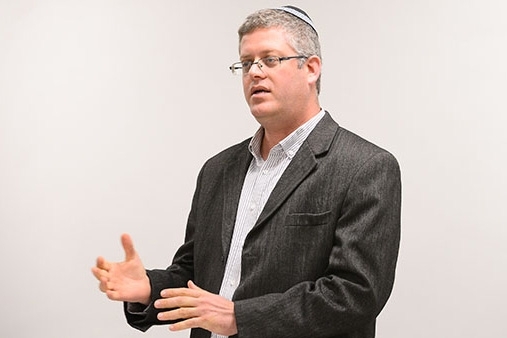
Rabbi Yaron Catane, who until recently served as Legal Counsel to the Chief Rabbinate of the State of Israel and now deals with religious affairs as a Legal Advisor in the Prime Minister’s Office, visited St. John’s School of Law on Tuesday, November 19, 2013 as a guest lecturer in Professor Keith Sharfman’s seminar on Jewish Law. The visit was sponsored by the Law School’s Center for Law and Religion.
Rabbi Catane was ordained as a Rabbi by the Chief Rabbinate of Israel. He earned LLB and LLM degrees from the Hebrew University in Jerusalem, as well as an MA degree in Public Policy in a special program at Hebrew University for senior public workers in the Israeli government. He has also been a visiting researcher at the Hauser Global Law School Program at NYU School of Law, and is a regular speaker and participant at international conferences on Law & Religion. He is currently in New York participating in a Law and Religion seminar sponsored by the Tikvah Advanced Institute.
As Legal Counsel to the Chief Rabbinate, Rabbi Catane was the highest ranking public official responsible for the legal administration of Jewish religious affairs in Israel. The broad scope of his regulatory mandate included many vital aspects of Jewish religious activity, including marriage, circumcision, burial, and the certification of kosher food. He also regularly advised on questions regarding legal rights, equality, and justice arising under Israel's non-separation model of state and religion. His most recent work focused on exploring and implementing a program that would enable the Chief Rabbinate to maintain its rabbinic authority while still also being a government unit.
At St. John’s, Rabbi Catane spoke to the Jewish Law seminar students about the origins, powers, and duties of his office, and about some of the legal and political issues that he encountered in his time there. He also commented on the Israeli Supreme Court’s recently activist role in reviewing the legality of the Chief Rabbinate's policies and decisions and thereby limiting the Chief Rabbinate’s authority. Finally, he spoke about the ways in which the Chief Rabbinate’s interpretations of traditional religious texts have also been subjected to increasing scrutiny by the high court.
Before the talk, Professor Sharfman presented Rabbi Catane with a copy of a 1953 letter penned by Israel’s first Chief Rabbi, Rabbi Isaac Halevi Herzog, to Professor Sharfman’s great uncle, Rabbi Harris Swift, acknowledging Rabbi Swift’s “able assistance in the erection of the Supreme Religious Centre in Jerusalem” – known in Hebrew as the Heichal Shlomo building – which housed the offices of the Chief Rabbinate for nearly 50 years.
Reflecting on Rabbi Catane’s visit, Professor Sharfman said: “There is much for American law students to learn from the Israeli approach to permitting religious law to play a role and, indeed, to flourish in the context and under the auspices of a secular state. We at St. John’s are therefore deeply grateful to Rabbi Catane for taking the time and making the effort to meet with our students and share with them his knowledge and experiences from his unique position at the intersection of Jewish and secular law in the State of Israel. It was also a thrill for me personally to learn from and connect with a representative of the Chief Rabbinate and to see how far the institution has come since its early days when my great uncle, Rabbi Harris Swift, helped to establish its physical presence in Jerusalem.”
Related News
TSOE Alumna Appointed Director of Curriculum in Amityville
Jessica Kemler ’99ED,’22Ed.D.—a double alumna of The School of Education at St. John’s University—began the new year as the new Director of Curriculum in the Amityville, NY, School District. “We are...
Alumna Celebrates Book Launch After Career Change
After developing a passion for helping the younger generation, Ashley Wilson ’14M.S.Ed. pivoted from a career in the music industry to work as an educator. She is also making her mark through her new...
Dean Jerrold Ross Conference Room Unveiled
On Tuesday, December 10, the newly renovated conference room on the fifth floor of Sullivan Hall was dedicated in honor of Jerrold Ross, Ph.D., former Dean of The School of Education . The renovation...
